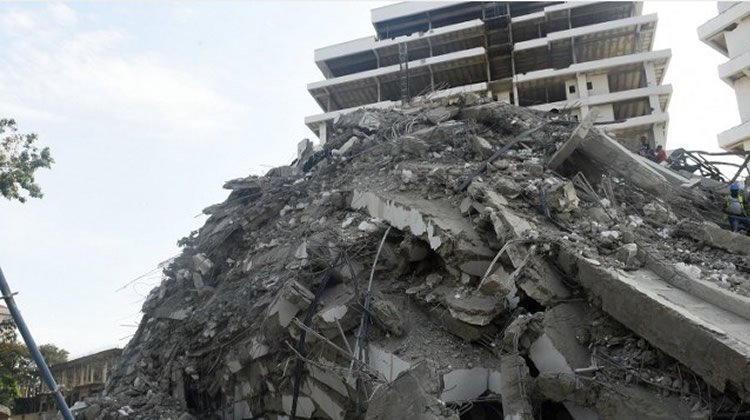
Experts drawn across different extractions of the built industry have called for concerted efforts toward bringing an end to the menace of building collapse in Lagos State.
The experts spoke at the T.M Olatunji Distinguished Annual Lecture organised by the Nigerian Institution of Civil Engineers held in Lagos on Wednesday.
In his keynote address, a former President of the Nigerian Institute of Builders, Builder Kunle Awobodu, decried the alarming rate of building collapses in the state.
According to him, even as he was about to deliver his paper, a breaking but bad news of another building collapse had surfaced in the media.
Awobodu added that lack of capacity had long been identified as the clog in the wheel of appropriate building control.
He said, “The alarming rate at which the BCPG record of collapsed buildings in Nigeria is being reviewed makes me appreciate the herculean task facing the updating team of the organisation searching around for news of collapsed buildings. Owners of 2 collapsed buildings usually try to conceal the information in order to circumvent the confiscation of their land by the government. For this reason, the BCPG records of collapsed buildings consist only of the ‘exposed’ or reported collapsed buildings.
“Experience has taught us that each time a building collapses in Nigeria, built environment professionals in other parts of the world tend to doubt the competence of professionals in the Nigerian Building Industry. Building collapse is a global phenomenon, but the frequency at which buildings collapse in Nigeria has attracted a worldwide concern on the need to assist this country to improve on its safety performance.”
An engineer and the Special Adviser for Works and Infrastructure to Lagos State Governor, Babajide SanwoOlu, Mrs Aramide Adeyoye, said it was instructive that infrastructure must be sustained if it was to benefit coming generations and its provision must be seen as an investment that would pay off many times over in the future.
She added that the prevention of infrastructure collapse as prevalent in Nigeria and other developing nations was a matter to be looked at critically.
She said, “The construction industry responsible for these infrastructures also accounts for a major proportion of the GDP of Nigeria. Therefore, seeking to improve the efficiency of the industry is very essential in promoting the growth of the Nigerian economy.
“It is important for professionalism to be exhibited in all stages of the infrastructure project cycle right from concept to planning to design to construction and maintenance stages. Professionalism is key to ensuring the sustainability of infrastructure and professionals are therefore expected to exhibit a high level of professionalism by adhering to their professional ethics when discharging their duties.”
She further stated that the public had seen the collapse of new and existing infrastructure across the country because of poor design and periodic assessment/maintenance.
She added, “To curb incessant infrastructure collapse using road infrastructure as a reference, we in Lagos State Government from the planning stage of our road projects have adopted measures to curb their early deterioration. Such measures include giving quality control and quality assurance high priority in our execution of road projects.”





